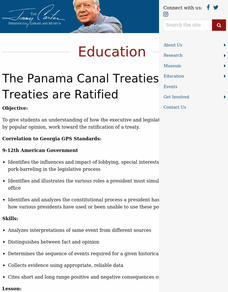Curated OER
Stepping Inside the Flowchart: How Does a Bill Become a Law?
Students explore the steps a bill must pass through to become a law and create a flow chart that maps the complexities of the process. They research the committees that are involved in a bill that relates to energy policy and the...
Curated OER
How Did That Get There?
Learners evaluate the role of government in addressing land use and other environmental issues. They analyze the powers, responsibilities, and limitations of elected and appointed officials in the national legislative, executive, and...
Curated OER
The Panama Canal Treaties: How Treaties Are Ratified
Students gain an understanding of how the executive and legislative branches, influenced by popular opinion, work toward the ratification of a treaty. They examine the influences and impact of lobbying and special interests in the...
Curated OER
Who Has the Greatest Voice?
Students identify the impact that interest groups, scientists, government health organizations and legislators have on health issues in the United States. They explain the role of the committee hearing in the lawmaking process. Students...
Curated OER
Successful Deaf Leaders in Government
Students create a "Who's Who" compilation of local, state, national and international leaders that advocate, introduce legislation, and lobby for the deaf. They use internet research to create a catalog of biographies and then conduct a...
Curated OER
Parliamentary Structure and Process on " Deck"
Tenth graders design a "deck" of individual slides on Power Point to synthesize, in a graphic organizer, their recently acquired knowledge of different levels of government in Canada.
Curated OER
America¿s Leader
Pupils examine the roles and responsibilities of the President of the United States. Using their textbook, they discover when the presidency was formed, how it works and what kind of power the President has. They also discuss how the...
Curated OER
Dorothea Dix: Reform in Massachusetts
Students examine the life and reform efforts of Dorothea Dix on behalf of people with disabilities. They discover how her efforts resulted in the passage of legislation. They also examine the care people with disabilities receive.
Curated OER
The Duties of Governments: Dix vs. Pierce
Students examine the role of Dorothea Dix on behalf of people with disabilities. They discuss President Pierce's veto of legislation she helped create. They address the rights and responsibilities of citizen's and the role of government.
Curated OER
US Constitution And Amendments
Learners become familiar with the US Constitution and consider how it affects their lives. They research the Preamble to articulate the purposes of government, compile collages, and research the separation of powers within each branch of...
Curated OER
What if the Senate were Reformed on the Triple E Model
Students investigate what the Canadian Senate does and what reform would do to the power relationship between the Prime Minister and the Senate.
Curated OER
Write a Constitution
Fourth graders examine the United states Constitution and discuss the difficulties the framers faced in writing it. They explore ideas about the division of power, rights, and other topics contained in it.
Curated OER
Researching Hate Crimes: Who and Why?
Students research contemporary information on hate crimes and on legislation designed to curtail and control such activity. They discuss the distinctive nature of hate crimes as opposed to other types of violent crimes. Students work...
Heritage Foundation
The House of Representatives
The House of Representatives has a lot of responsibility in the United States government. But how did it all begin, and why is it the way it is now? A comprehensive lesson plan answers all of these questions about the US...
Curated OER
Arkansas Black Pioneers: A History of African-American Colonies in Arkansas
Students identify various regions of early Arkansas as these regions relate to African American colonies that settled in Arkansas after the Civil War.
Curated OER
Teaching Six Big Ideas in the Constitution
Students debate the constitutional principles of the United States. For this U.S. government lesson, students examine the meaning of the text of the U.S. Constitution and analyze other primary documents of the era. Students prepare for...
Curated OER
Challenges to the Concert System
A panoramic view of the European revolutions of the 19th century ties these slides together, which feature paintings and maps to illustrate the effects of each revolution. Details and information about the Greek, Belgian, French, and...
Heritage Foundation
Courts and Judges
If the Supreme Court is so supreme, why do all cases not just start there? High schoolers learn why every case does not start at the Supreme Court as well as the importance of hierarchy in the US judicial system in the 11th installment...
Humanities Texas
Primary Source Worksheet: Franklin D. Roosevelt, First Inaugural Address
Young historians will learn not to fear primary source materials (or fear itself, for that matter) thanks to this resource that uses Franklin D. Roosevelt's March 4, 1933 Inaugural Address to model how to conduct a close reading of such...
Humanities Texas
A President's Vision: Theodore Roosevelt
Through an engaging, interactive experience analyzing primary sources, invite your young historians to take a closer look at the presidency of Theodore Roosevelt.
National Endowment for the Humanities
Cultural Change
High schoolers research the passage of the 19th Amendment as an illustration of the mutual influence between political ideas and cultural attitudes. They also read the Seneca Falls Declaration and explore the cultural shifts it both...
Heritage Foundation
The Senate
Do your learners struggle to understand the differences between the Senate and the House of Representatives? Help them develop an understanding of how the US Constitution's clauses affect the Senate's operations. A high-quality...
Curated OER
Teaching With Documents: U.S. Constitution Workshop
What does it mean to be American? Explore the constitution and what it really means to be a citizen here. First, learners of all ages will investigate different primary source documents. Then, they establish each document's...
Curated OER
4-H Citizenship Activity Page - Beginning Level
This is a 4-H citizenship activity that asks learners to examine county government, city councils, the three branches of the United States government, and complete a community service project. It also includes a word search,...























